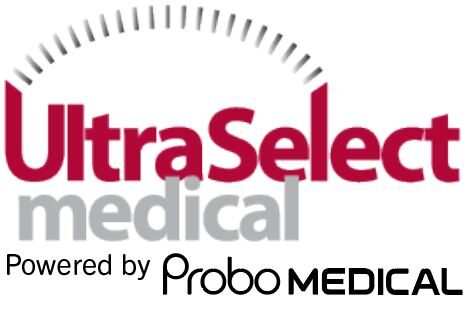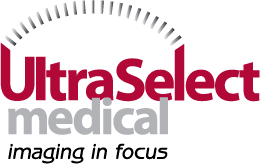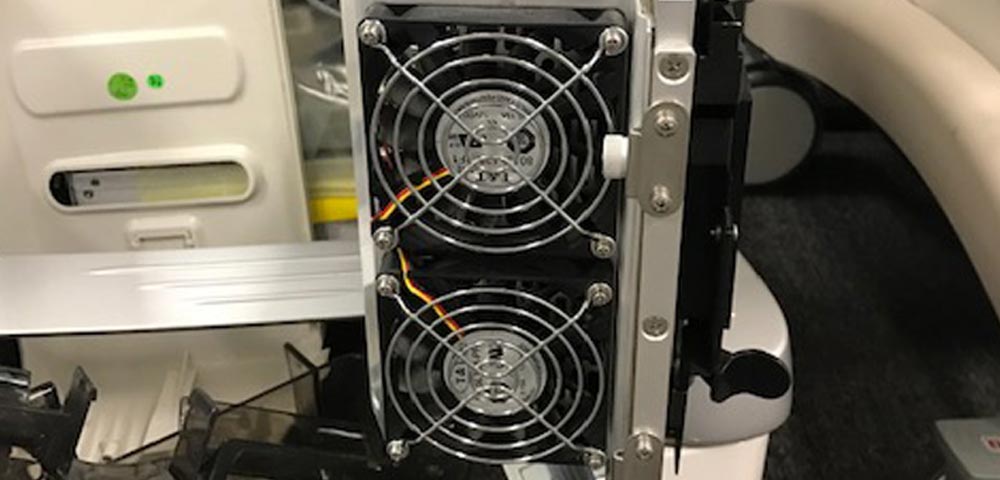June 9, 2020
Since the Corona Virus pandemic and the subsequent COVID 19 infection, there is extreme concern about disinfection procedures for ultrasound machines.
Rightfully so. This will not be the first time we will confront a life-threatening pathogen. We will not cover transducer disinfection as there is more than enough information on manufacturer’s websites to explain that issue. This blog will cover the questions we have been asked by social media, telephone calls and emails. The number one question we were asked is does the air flow in and out of the ultrasound machine spread disease?
The answer to that has not been studied well enough and has not been published.
Since this is of concern, we have discussed this issue in the repair lab. We would like to talk about these concerns. All ultrasound machine use fans and filters. There is an air intake and air output. The average of air circulation is 24 cubic feet per minute. It is less for small machines and more for larger and older machines. This is where the concern stems from. The ultrasound machines are in some very pathogenic environments. However all systems are not designed to filter out pathogens. The filters in ultrasound machines are designed to handle dust, mold and larger micron objects that would collect on the hardware and cause an overheating event on the machine. Viruses and bacteriologics are very small. The Coronoa virus is about 0.125 micron or 125 nanometers. In other words the virus is very, very small. How do we protect ourselves?
The best answer to that is it depends on what type of system you have. The small portable ultrasound units have internal fans that require the proper repair specialists to clean them. However these machines have the least air throughput and would be ideal for use in such contaminated areas. The tablet systems like the Mindray TE5/TE7, Philips Lumify and the GE Venue Go series are ideal for these areas due to the small volume of air circulation required for cooling.
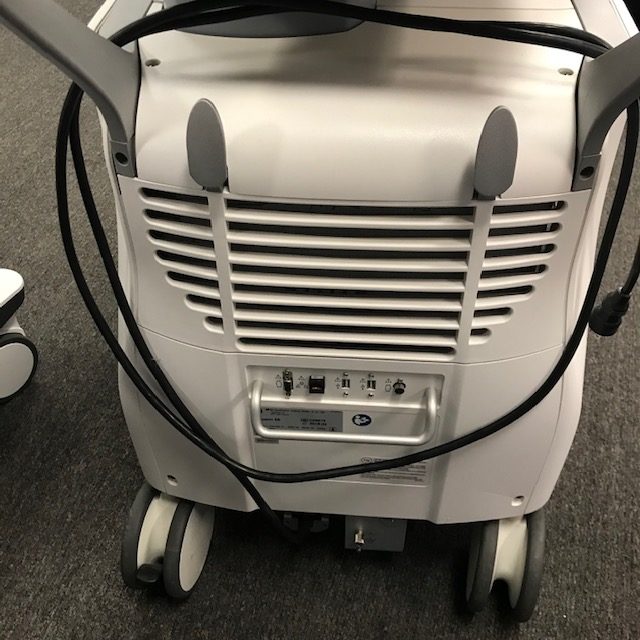
GE Voluson E6 - n++Back panel on- snap on feature
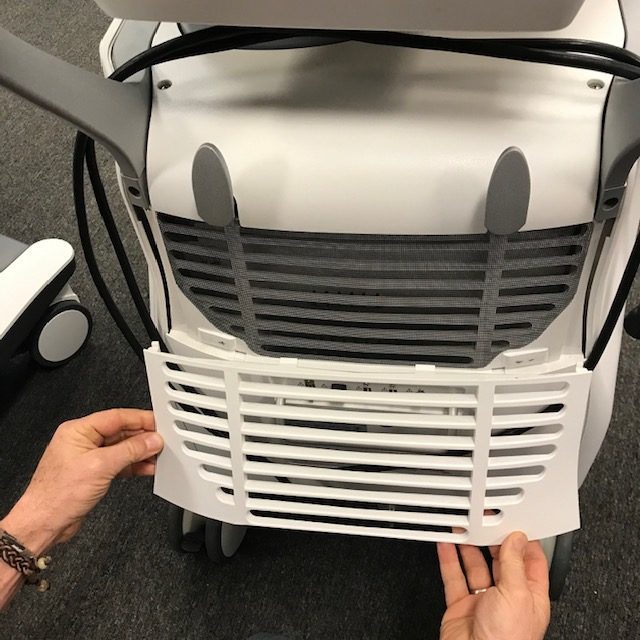
GE Voluson E6 -Where filter is located on this console machine
The next group of ultrasound machines that are a good fit for the germ laden rooms is Mindray M7, M8 the GE suite of laptop type systems and the Philips CX50. They are portable and require less airflow than larger systems but they still have a very low air throughput. These classifications of systems require the properly trained repair people to access the filters and fans to be cleaned.
The last types of machines that prompt the most concern are the console systems. Mindray DC8 to the DC 90, The GE Voluson P, S and E series, Canon Aplio, GE Vivid E95 to the T9, GE Logiq P, S and E series, Philips Epiq and Affinity series and Samsung WS series, just to name a few, are the systems that have the most air circulation. Generally, the newer the system, the less airflow is required to cool the system due to the modern miniaturization of components.
In all console systems, regardless of manufacturer or model, the filters are not generic in location and are located in different positions anywhere on the machine. Some filters are removable, some are not. You can see from the pictures some areas where they are found. If you are unsure of where the filter is located, contact the manufacturer or the service provider of the machine. The filter cleaning falls to the owners of the machine and should be cleaned a minimum of every week during this crisis. It is important to follow the OEM guidelines to clean them. If a vacuum is used, the vacuum’s filter should be HEPA compliant.
In a previous blog, “Post Purchase Thoughts under Quality Measures”, we talked about the importance of maintaining your equipment. That is more important now that we are faced with a health crisis. These machines and filters should be cleaned before and after each encounter with a contaminated patient. The fans cannot be cleaned because as you can see from the last picture the machine has to be taken a part to do that.
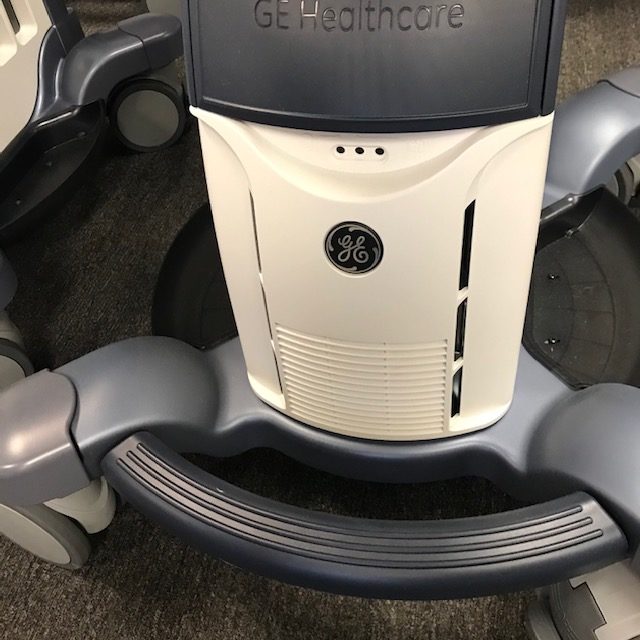
GE Logiq S8 - Front panel on -snap on closure
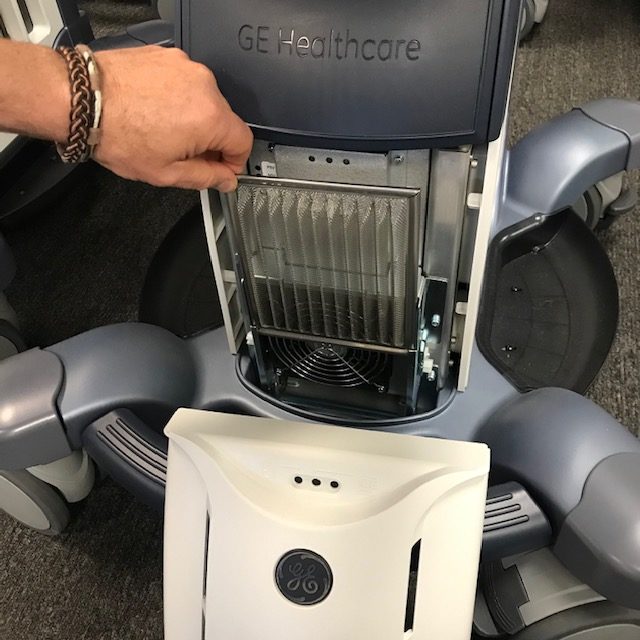
GE Logiq S8 - n++Front panel removed to show filter
What does the future hold?
Some manufacturers are experimenting with UVC methods of disinfection. Others are looking at machine coverings. A word of caution here, no covering should be used to block the air throughput areas. Doing so can cause machine failure, machine malfunctions and image degradation due to blocked airflow and heat buildup inside the machine. Some manufacturers sell lightweight plastic coverings that can be removed and cleaned. Some institutions have used certified surgical cloth to cover and minimize air movement. It is never recommended to insert another HEPA filter on, in or on top of the filter in the machines, or modify the existing filters in any way. This increases heat in the system and can lead to machine failure. In addition, it is never recommended to spray any germicidals into the machines as that may cause electronic circuit board failure and damage to other liquid sensitive internal components.
There are several topics that need further research. The UVC may show promise but there are some logistics that need to be worked out and the expense may be prohibitive. The other thing manufacturers need to consider is to place the fans and filters in easily accessible places so they can be cleaned and disinfected often.
Written by Robert Powell and Lisa Bachan
Sources:
- www.cdc.gov/coronavirus
- Summit Imaging, Youtube video Philips iU22 and iE33 Ultrasound Intake Tray Assembly. 4/13/2017.
- Advanced Biotechnology Inc. Blog. No author listed, Is UV Sterilization Effective for Killing Viruses and Bacteria, 8/12/2019
If you have any questions or concerns please call 843-566-1020
